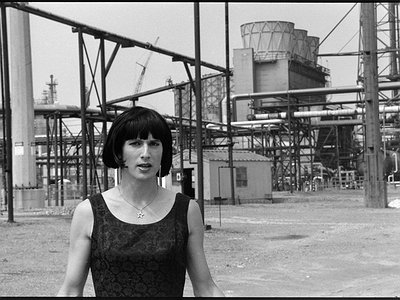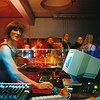Part 3
Could you take us through a day in your life, from a possible morning routine through to your work? Do you have a fixed schedule? How do music and other aspects of your life feed back into each other - do you separate them or instead try to make them blend seamlessly?
My creativity is erratic and arrives in episodic spasms. I try to create hospitable conditions within myself, so that my muse will be more inclined to visit and stay longer when it does. I drink a lot of coffee and take copious notes. David Lynch is one of my main inspirations in this regard. I have lists and spreadsheets for just about everything. I used to stay up all night for days but my health won’t stand it anymore. I crave solitude and quiet. I’m an incurable workaholic, and oddly I do some of my best work while I’m asleep. I wake up with a solution, and then realize I’m exhausted because I worked all night in my dreams.
Could you describe your creative process on the basis of your new album Apologize To The Future? Where did the ideas come from, how were they transformed in your mind, what did you start with and how did you refine these beginnings into the finished work of art?
The album contains around 1,200 words, all in rhyme. I studied rap in order to better develop my rhyming schemes. The words predate the music, sometimes by months or even years. I read an entire bookcase full of books about the climate crisis. The album springs from those books, and from decades of assimilating and disseminating unpleasant environmental truths.
The idea of apologizing to your children came from Dan Miller’s presentation “A REALLY Inconvenient Truth” which is available on YouTube. He lists things individuals can do, and his first item is “Ask your children for forgiveness.” This led me to a thought experiment, in which I asked myself “How will future generations regard us?” Assuming future generations are lucky—or unlucky?—enough to exist, they’ll resent us for sending them to hell.
Another source was my “Metadelusion” blog, which started with my poem “Less.” The poem’s theme is that it’s too late to avoid catastrophe, but not too late to slow down. As the poem says, “Less can no longer be avoided / Less could be gradual, or sudden / Less will hurt, either way / Sudden will break more bones.”
The Kubler-Ross “five stages of grief” model is another influence. We’re stuck at denial, and we need to get past that to arrive at the crucial final stage of acceptance. Now that disaster is upon us, hating humanity is pointlessly cruel. Instead we should feel sorry for ourselves, since we’re our own worst enemy. This observation is the essence of the post-antihuman Church of Euthanasia.
Still another source is David Quammen’s article “Planet of Weeds” about the paleontology of mass extinctions. “A Thin Layer of Oily Rock” is a reference to the Permian-Triassic extinction, the so-called “Great Dying” which eliminated 96% of all marine species and 70% of terrestrial vertebrate species. A similar mass extinction is already underway.
William R. Catton’s 1980 classic “Overshoot” is yet another influence. Catton viewed humanity through the lens of population biology, and was the probably the first to popularize the term “overshoot” in reference to human overpopulation and overconsumption.
There are many descriptions of the ideal state of mind for being creative. What is it like for you? What supports this ideal state of mind and what are distractions? Are there strategies to enter into this state more easily?
In March 2019, I spent a week alone in a rented apartment in Lisbon writing “Singularity,” which features some of my most brutal depictions of the future. Lines like “Picking through the rubble of society / Mountains of toxic trash our legacy” were traumatic to write. It’s horrifying to contemplate a future without civilization or decency, a lawless world in which only criminals are free.
I needed to be alone for long periods in order to transmute my rage into something constructive. “Apologize to the Future” was painful to create, and I still find it painful to listen to. It’s supposed to hurt. Earth’s in disarray, and we need to feel the ugliness of what we’ve done. We need to grieve for what we’ve destroyed, including our own future. Without remorse there can’t be restitution.
How do you see the relationship between the 'sound' aspects of music and the 'composition' aspects? How do you work with sound and timbre to meet certain production ideas and in which way can certain sounds already take on compositional qualities?
While composing, I usually find it sufficient to work with generic timbres such as piano, bass and strings. Sound design distracts me from composing, so I prefer to have less options. When synthesizers were relatively new I used to enjoy programming them, but now I find it tedious. As my work becomes more harmonically nuanced, I increasingly use classical acoustic sounds, because they do a much better job of rendering ambiguous or dissonant tonality. A gritty synth patch that may be fine for the pentatonic scale will obliterate a very tense chord.
Our sense of hearing shares intriguing connections to other senses. From your experience, what are some of the most inspiring overlaps between different senses - and what do they tell us about the way our senses work? What happens to sound at its outermost borders?
I don’t experience synesthesia and I haven’t found that musical concepts translate easily into the visual domain, or vice versa. I often try to visualize musical relationships, sometimes successfully, but music itself is uniquely auditory.
Art can be a purpose in its own right, but it can also directly feed back into everyday life, take on a social and political role and lead to more engagement. This seems particularly true with regards to Apologize To The Future. Do you think [techno] music can truly be political? Can you describe your approach to art and being an artist?
Of course techno music can be political! I’ve been making political techno since 1994, starting with “Save the Planet, Kill Yourself.”
My approach to art is to cultivate inspiration and avoid considering the opinions of others. Artists should strive to express their vision faithfully. Art is personal. I’m a peculiar and polarizing person, and my art often reflects these same qualities.
It is remarkable, in a way, that we have arrived in the 21st century with the basic concept of music still intact. Do you have a vision of music, an idea of what music could be beyond its current form?
I don’t find it so remarkable. As long as we exist and have ears we’ll have music. The question reminds me of the period when all-black paintings were in vogue. Ad Reinhardt’s “Last Paintings” weren’t and couldn’t have been the end of art, because we see in color, and would inevitably tire of monochromatic art. Assuming civilization doesn’t collapse—admittedly a big leap of faith—harmonically complex music is bound to return, because people are biologically equipped to hear subtle changes in tonality.
I hope polymeter fulfills its potential in the 21st century. I submit my work as evidence that a vast musical territory remains largely unexplored. I make my software free and open source because I want people to follow in my footsteps and continue exploring this fascinating frontier long after I’m gone. This statement is admittedly hard to reconcile with the climate crisis, but I’m used to living with cognitive dissonance.







